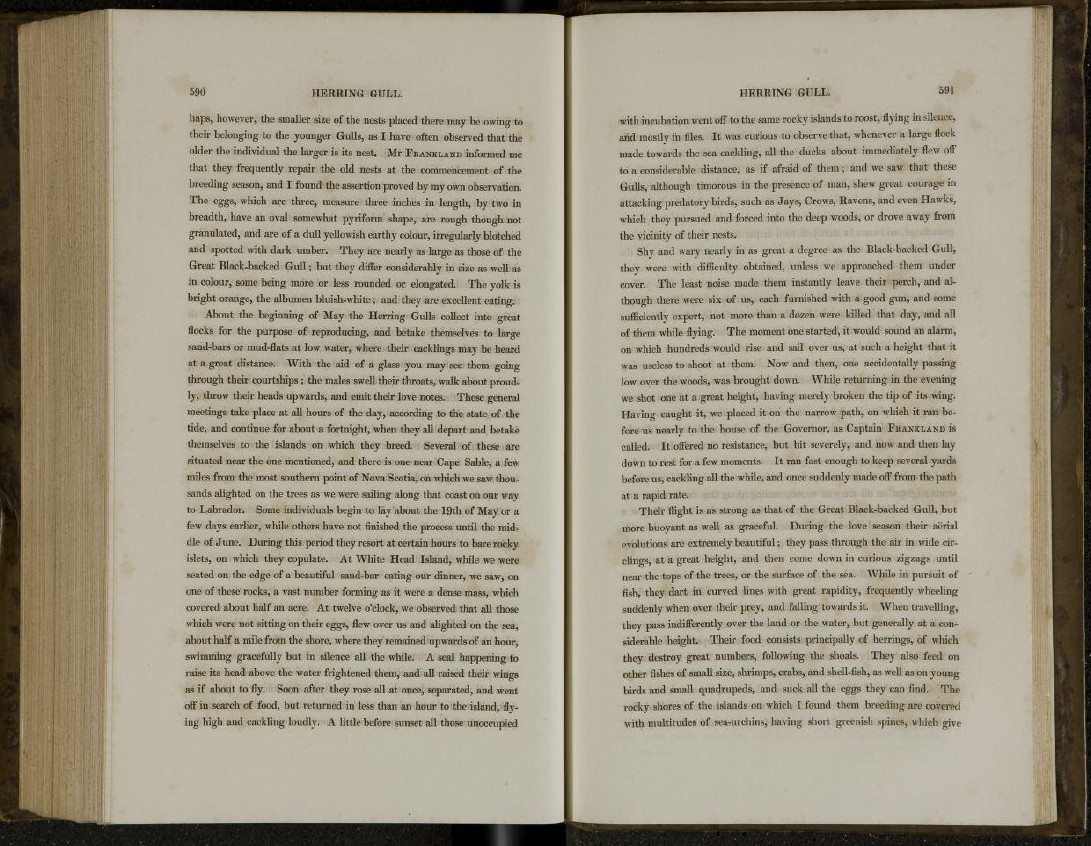
59Ö HERRING GULL.
haps, however, the smaller size of the nests placed there may be owing to
their belonging to the younger Gulls, as I have often observed that the
older the individual the larger is its nest. Mr FRANKLAND informed me
that they frequently repair the old nests at the commencement of the
breeding season, and I found the assertion proved by my own observation.
The eggs, which are three, measure three inches in length, by two in
breadth, have an oval somewhat pyriform shape, are rough though not
granulated, and are of a dull yellowish earthy colour, irregularly blotched
and spotted with dark umber. They are nearly as large as those of the
Great Black-backed Gull; but they differ considerably in size as well as
in colour, some being more or less rounded or elongated. The yolk is
bright orange, the albumen bluish-white; and they are excellent eating.
About the beginning of May the Herring Gulls collect into great
flocks for the purpose of reproducing, and betake themselves to large
sand-bars or mud-flats at low water, where their cacklings may be heard
at a great distance. With the aid of a glass you may see them going
through their courtships ; the males swell their throats, walk about proudly,
throw their heads upwards, and emit their love notes. These general
meetings take place at all hours of the day, according to the state of the
tide, and continue for about a fortnight, when they all depart and betake
themselves to the islands on which they breed. Several of these are
situated near the one mentioned, and there is one near Cape Sable, a fewmiles
from the most southern point of Nova Scotia, on which we saw thousands
alighted on the trees as we were sailing along that coast on our way
to Labrador. Some individuals begin to lay about the 19th of May or a
few days earlier, while others have not finished the process until the middle
of June. During this period they resort at certain hours to bare rocky
islets, on which they copulate. At White Head Island, while we were
seated on the edge of a beautiful sand-bar eating our dinner, we saw, on
one of these rocks, a vast number forming as it were a dense mass, which
covered about half an acre. At twelve o'clock, we observed that all those
which were not sitting on their eggs, flew over us and alighted on the sea,
about half a mile from the shore, where they remained upwards of an hour,
swimming gracefully but in silence all the while. A seal happening to
raise its head above the water frightened them, and all raised their wings
as if about to fly. Soon after they rose all at once, separated, and went
off in search of food, but returned in less than an hour to the island, flying
high and cackling loudly. A little before sunset all those unoccupied
HERRING GULL. 591
with incubation went off to the same rocky islands to roost, flying in silence,
and mostly in files. It was curious to observe that, whenever a large flock
made towards the sea cackling, all the ducks about immediately flew off
to a considerable distance, as if afraid of them; and we saw that these
Gulls, although timorous in the presence of man, shew great courage in
attacking predatory birds, such as Jays, Crows, Ravens, and even Hawks,
which they pursued and forced into the deep woods, or drove away from
the vicinity of their nests.
Shy and wary nearly in as great a degree as the Black-backed Gull,
they were with difficulty obtained, unless we approached them under
cover. The least noise made them instantly leave their perch, and although
there were six of us, each furnished with a good gun, and some
sufficiently expert, not more than a dozen were killed that day, and all
of them while flying. The moment one started, it would sound an alarm,
on which hundreds would rise and sail over us, at such a height that it
was useless to shoot at them. Now and then, one accidentally passing
low over the woods, was brought down. While returning in the evening
wre shot one at a great height, having merely broken the tip of its wing.
Having caught it, we placed it on the narrow path, on which it ran before
us nearly to the house of the Governor, as Captain FRANKLAND is
called. It offered no resistance, but bit severely, and now and then lay
down to rest for a few moments. It ran fast enough to keep several yards
before us, cackling all the while, and once suddenly made off from the path
at a rapid rate.
Their flight is as strong as that of the Great Black-backed Gull, but
more buoyant as well as graceful. During the love season their aerial
evolutions are extremely beautiful; they pass through the air in wide circlings,
at a great height, and then come down in curious zigzags until
near the tops of the trees, or the surface of the sea. While in pursuit of
fish, they dart in curved lines with great rapidity, frequently wheeling
suddenly when over their prey, and falling towards it. When travelling,
they pass indifferently over the land or the water, but generally at a considerable
height. Their food consists principally of herrings, of which
they destroy great numbers, following the shoals. They also feed on
other fishes of small size, shrimps, crabs, and shell-fish, as well as on voung
birds and small quadrupeds, and suck all the eggs they can find. The
rocky shores of the islands on which I found them breeding are covered
with multitudes of sea-urchins, having short greenish spines, which give